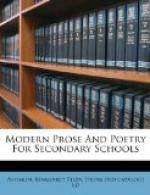This incident impressed me more than anything I had heard in advance of the freedom of education in America. It was a concrete proof—almost the thing itself. One had to experience it to understand it.
It was a great disappointment to be told by my father that we were not to enter upon our school career at once. It was too near the end of the term, he said, and we were going to move to Crescent Beach in a week or so. We had to wait until the opening of the schools in September. What a loss of precious time—from May till September!
Not that the time was really lost. Even the interval on Union Place was crowded with lessons and experiences. We had to visit the stores and be dressed from head to foot in American clothing; we had to learn the mysteries of the iron stove, the washboard, and the speaking-tube; we had to learn to trade with the fruit peddler through the window, and not to be afraid of the policeman; and, above all, we had to learn English.
The kind people who assisted us in these important matters form a group by themselves in the gallery of my friends. If I had never seen them from those early days till now, I should still have remembered them with gratitude. When I enumerate the long list of American teachers, I must begin with those who came to us on Wall Street and taught us our first steps. To my mother, in her perplexity over the cookstove, the woman who showed her how to make the fire was an angel of deliverance. A fairy godmother to us children was she who led us to a wonderful country called “uptown,” where in a dazzlingly beautiful palace called a “department store,” we exchanged our hateful homemade European costumes, which pointed us out as “greenhorns” to the children on the street, for real American machine-made garments, and issued forth glorified in each other’s eyes.
With our despised immigrant clothing we shed also our impossible Hebrew names. A committee of our friends, several years ahead of us in American experience, put their heads together and concocted American names for us all. Those of our real names that had no pleasing American equivalents they ruthlessly discarded, content if they retained the initials. My mother, possessing a name that was not easily translatable, was punished with the undignified nickname of Annie. Fetchke, Joseph, and Deborah issued as Frieda, Joseph, and Dora, respectively. As for poor me, I was simply cheated. The name they gave me was hardly new. My Hebrew name being Maryashe in full, Mashke for short, Russianized into Marya (Mar-ya) my friends said that it would hold good in English as Mary; which was very disappointing, as I longed to possess a strange-sounding American name like the others.
I am forgetting the consolation I had, in this matter of names, from the use of my surname, which I have had no occasion to mention until now. I found on my arrival that my father was “Mr. Antin” on the slightest provocation, and not, as in Polotzk, on state occasions alone. And so I was “Mary Antin,” and I felt very important to answer to such a dignified title. It was just like America that even plain people should wear their surnames on week days.




